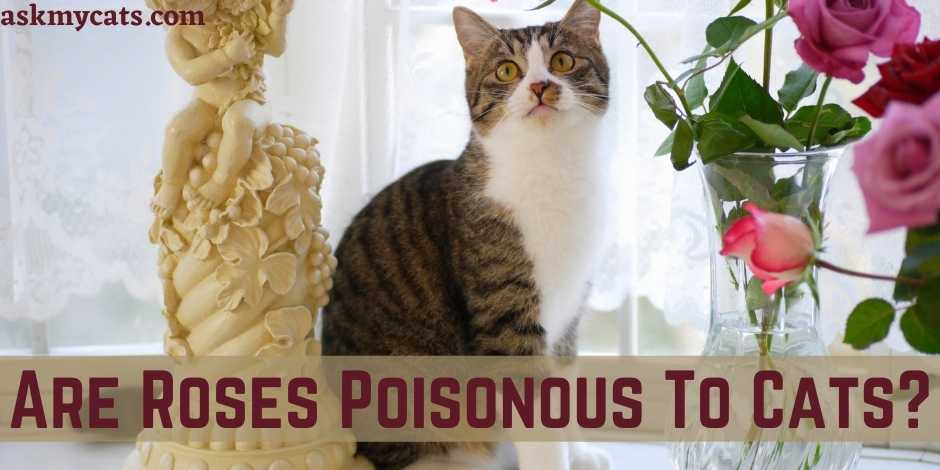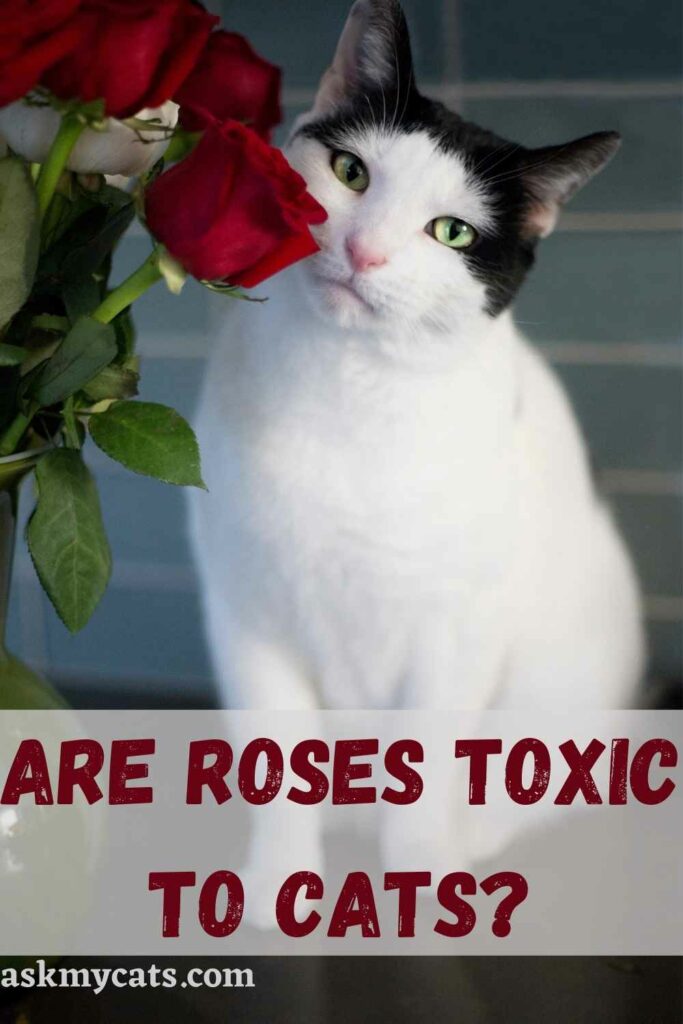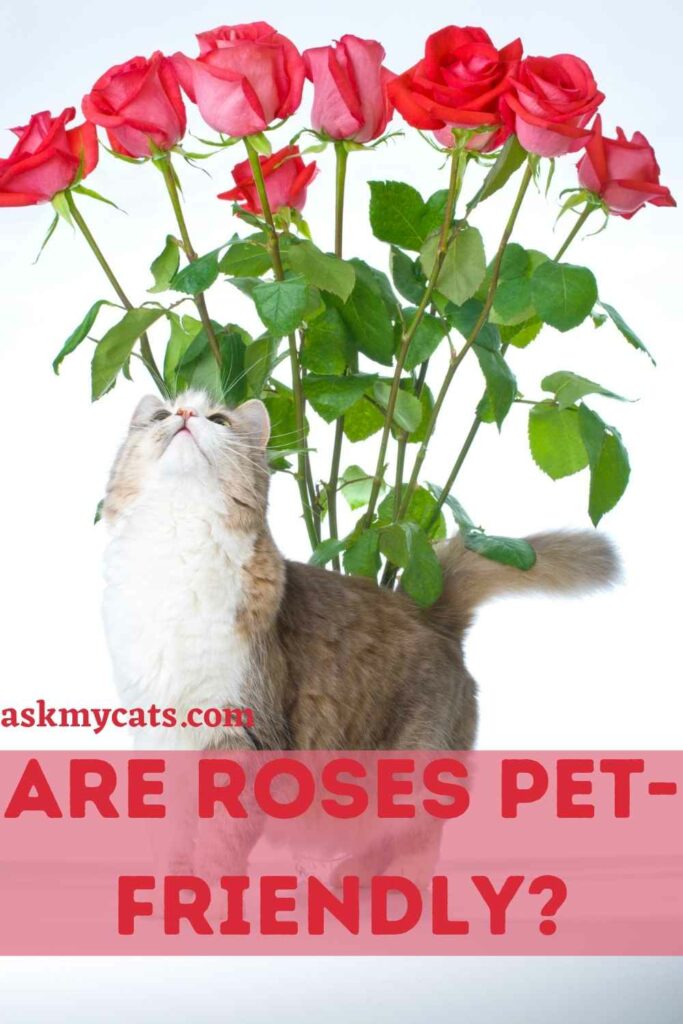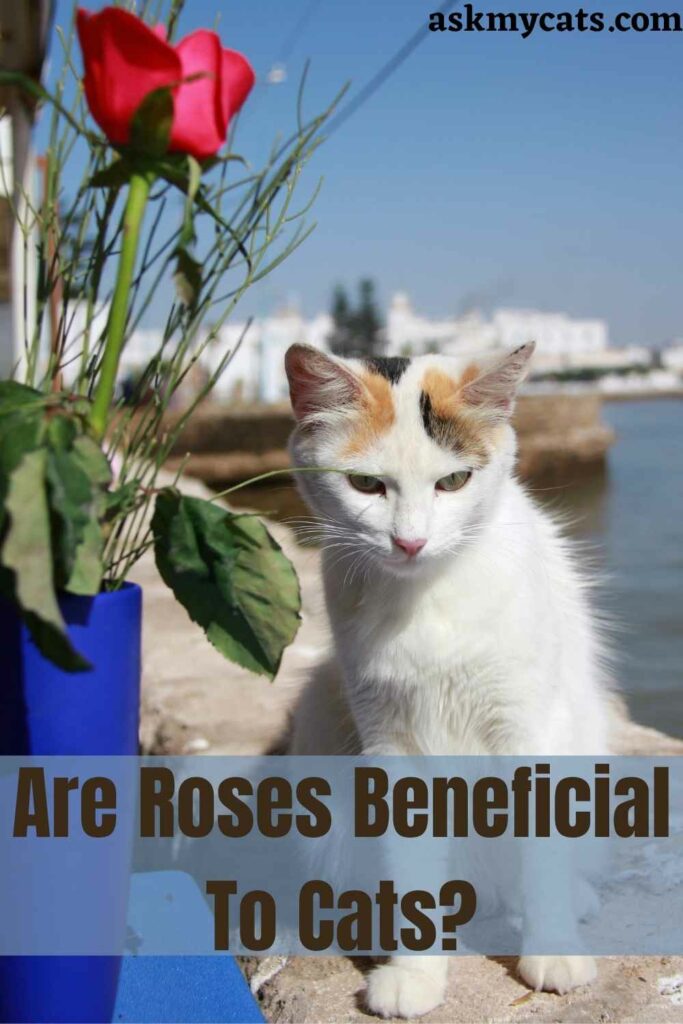Roses come in over 150 varieties, and if you combine roses and cats, there’s a strong chance your feline pal would enjoy nibbling on these lovely blooms. Roses can be a romantic gift for Valentine’s Day, your anniversary, or simply a typical date night.
Just because these flowers are popular doesn’t imply, they’re a good present for everyone. It’s crucial to know which plants are regarded safe, especially if you live in a home with pets.
Cat owners are frequently concerned about the safety of their indoor and outdoor plants and flowers.
So, are roses poisonous to cats?
No, roses are not poisonous to cats. True roses in the genus Rosa are safe for your cat to eat, according to the American Society for the Prevention of Cruelty to Animals (ASPCA), assuming he or she doesn’t mind a few thorns for their trouble.
This article will inform you all about cats and roses and how can they both co-exist.


Give Your Cat the Perfect Day
Get the Free Ebook!
Are Roses Toxic To Cats?
No, roses are not toxic to cats.

Roses are not toxic to your cat, but she may injure herself if she gets too close to the sharp thorns.
According to the Missouri Botanical Garden, roses grow in USDA plant hardiness zones 5 through 9, depending on the species and cultivar.
Roses come in over 150 different species and varieties, each with its own set of spectacular and fragrant blooms.
Red, pink, yellow, white, purple, and orange are among the colours available in single or double blossoms.
According to the American Society for the Prevention of Cruelty to Animals, all plants in the Rosa genus are harmless to cats.
This implies that if your cat eats thornless green leaves or the bright petals of your garden roses, she may have mild gastrointestinal problems but will be alright.
While no component of the rose bush is poisonous to cats, the sharp thorns found along the stems and branches can be dangerous, according to Pet Poison Helpline.
If your cat rubs against the rose bush, the thorns can damage his skin and eyes, or become embedded in his paws if he treads on fallen branches.
If your cat eats the thorns, he could develop more serious complications, such as oral injury and intestine obstruction.
Drooling, pawing at the mouth, loss of appetite, abdominal pain, vomiting, and diarrhoea are some of the symptoms.
Keep your cat away from the roses in your garden and remove the thorns from any cut roses you bring home to keep her safe. Contact your veterinarian if your cat is injured by the prickly branches.
While thornless roses are a popular cut flower that you and your cat can enjoy in your home, there are other popular houseplants that are harmful to cats.
If you have an outside cat, examine the American Society for the Prevention of Cruelty to Animals’ list of plants that are harmful to cats before bringing any new plant into your house or garden.
Because keeping an agile kitty from leaping to high ledges can be difficult, there are few places to store hazardous plants where you can appreciate them while keeping them out of reach. It’s usually preferable to avoid these plants entirely and opt for safer alternatives.
Pets, such as cats, dogs, and horses, are unaffected by true roses (Rosa spp.). Cut flowers for families with indoor dogs are a good choice.
Pets may be harmed by roses in the garden, potted roses sprayed with insecticides, and certain garden products used on roses, though there are techniques to reduce the dangers.
Always look up a plant’s toxicity using its botanical name. Despite the fact that many flowering plants contain the word “rose” in their common name, they are not real roses.
Roses may be grown in USDA plant hardiness zones 6 through 9, with certain cultivars tolerating larger temperature fluctuations.
There is no proof that roses are poisonous to pets, according to the American Society for the Prevention of Cruelty to Animals.
Roses are considered a pet-safe cut flower in the floristry profession. While chewing the flower petals and leaves is relatively safe for cats and dogs, ingesting rose blooms or leaves may cause stomach trouble.
It’s better to keep rose vases out of pets’ reach and discourage them from playing with them. Pets may be harmed by insecticides, fungicides, or weed killers used on flowers, potted roses, or outdoor rose bushes.
If you believe your pet has eaten a piece of a plant or a garden product, contact your veterinarian.
Are Roses Pet-Friendly?
Yes, true roses are considered pet-friendly.

Because many species aren’t roses but are referred to as such, the answer can be a little complex.
True roses in the genus Rosa are safe for your cat to eat, according to the American Society for the Prevention of Cruelty to Animals (ASPCA), assuming he or she doesn’t mind a few thorns for their trouble.
Just make sure they don’t eat any chemicals or household pesticides that could be harmful to them.
It’s important to keep in mind that ingesting thorns might cause abdominal pain, mouth damage, and intestinal obstruction.
Similarly, while cats may nibble on greens to promote digestion, eating too much might cause an upset stomach or a mild bout of diarrhoea.
The petals and leaves are not poisonous. If Kitty overeats, she might get an upset stomach and diarrhoea, but the same could be true of too much kibble.
Kitty may most likely receive pricked paws or a scratched nose if she plays too rough with a prickly bush or stem. If you use chemical pesticides on your roses, your cat may become poisoned if they lick a treated area.
According to the American Society for the Prevention of Cruelty to Animals, cats will not be harmed if they eat rose petals because the rose is not harmful to cats. However, ingesting plant material frequently results in unpleasant gastrointestinal symptoms.
Although cats will not be harmed if they eat rose petals, keeping them away from your plants is a good idea.
Ingestion of the prickly sections of the rose bush can cause injuries, as can responses to chemicals and pesticides.
Providing cats with catnip or wheatgrass to chew on will not damage them and may help them resist the impulse to devour other plants.
A typical rose is not poisonous to cats, according to the ASPCA. Any roses you buy for Valentine’s Day or from your rose shrub will not upset your cat’s tummy if they eat them.
Roses are only hazardous to cats if pesticides are used in their cultivation or treatment. In other words, it is the chemicals, not the roses, that can hurt the cat.
If you buy roses in a bouquet from a store, there shouldn’t be enough toxins left in the flowers to cause a severe problem for your cat. If you put pesticides on your rose shrub, though, it may become toxic.
It’s vital to note that roses aren’t entirely safe for your cat. When your cat gets into a bouquet or makes a mess in your rose garden, the thorns might snag them and cause minor scratches and bleeding.
Most cats, on the other hand, will realize their error and cease meddling with the roses before any serious cuts appear.
If your cat eats the leaves and stems, which are often thorny, they will most likely experience stomach pain.
This stomach ailment won’t be serious, but seeing your cat in pain might be upsetting. It should, however, not cause any major problems.
With this in mind, the most trauma your cat will experience from eating your roses is a couple of scratches at most and a good talking to from you.
Are Roses Beneficial To Cats?
No, roses are not beneficial to cats in any way, shape, or form.

It’s reasonable to question if you should feed your cat roses because they’re not hazardous to cats.
Though eating roses isn’t harmful to them, urging them to do so is pointless.
Roses provide no nutritional value to cats, and they are unlikely to enjoy them in the first place.
Cats are carnivores by nature. They require a lot of protein from meat to maintain strong bones, organs, and the reproductive system.
Chicken, beef, turkey, and other meats fall within this category.
They don’t require a large number of plants to survive. This includes roses and other flowers.
Cats, on the other hand, are less likely to appreciate the snack. Cats, unlike other animals, are unable to detect sweet flavours.
Experts say that because they eat mostly meat, they never learned to appreciate sweetness. Cats dislike eating roses and other flowers because they have a floral and sweet flavour. Even if the flower type isn’t harmful, it’s pointless to give your cat roses.
Which Non-Rosa Roses Are Poisonous To Cats?
The following non-rosa roses are poisonous to cats: –
- While roses are not poisonous, there are several poisonous plants that resemble roses and include the word “rose” in their common name.
- Adenium (every variety of desert rose) contains very toxic sap that has been known to kill elephants.
- In Europe, the Helleborus niger (also known as the Christmas rose or Easter rose) is a popular ornamental plant that blooms from December to April. This plant’s entire body is extremely toxic.
- Hibiscus syriacus (also known as rose of Sharon) has a perfume that cats adore, but it is moderately hazardous when eaten.
- Although Portulaca oleracea (also known as moss rose) is widely used as a ground cover and is totally edible to people, it is extremely toxic to cats, particularly the leaves.
- Primula vulgaris (also known as primrose) is a non-toxic plant that will cause your pet to vomit if eaten but will not hurt them otherwise.
- Rhododendron (AHA rose tree, rosebay, or azalea) is renowned for having very toxic leaves and roots that can be lethal in even little amounts.
How To Keep Cats Away From Roses?
You can keep cats away from roses by: –
Even if your cat will not be hurt if your cat eats the green leaves of your roses, it will make your flowers look unappealing and may shorten the life of your cut flowers.
While the leaves below the water line in your vase should be removed, retaining as much healthy foliage on the plant as possible can aid the cut flowers in pulling water up the stem.
Although removing the thorns causes wounds, the University of Florida IFAS Gardening Solutions recommends doing so for your cat’s protection.
Place the flowers in a location where your cat is unlikely to bother them if at all feasible. Avoid tables where he has easy access or where he frequently sits.
Place rocks on the soil surface of your potted rose to deter your cat from digging or standing in the pot. Consider providing more appealing distractions than your cut flowers.
According to the University of Wisconsin-Madison Division of Extension, make sure he has plenty of toys and consider growing oats or other grains in a pot for him to gnaw on.
If none of the other solutions works, you may always surround your rose garden with a fence. A physical barrier will keep the cat and other animals out.
You’ll need a fence that cats can’t get through because they’re so little and nimble. Chicken wire is a good choice because cats can’t get through the wire slats and it’s cheap.
Frequently Asked Questions
What Happens If Cats Eat Roses?
Even though rose petals are not hazardous to cats, knowing the indications of poisoning in your cat is beneficial. This will assist you in properly treating your cat after they have ingested anything without your awareness. Though the symptoms differ from one cat to the next, the majority of them share some characteristics. Any redness, itching, or swelling around the skin, eyes, or mouth are some of the most acute symptoms to look for. This indicates that your cat has gotten itself into something it shouldn’t have. These signs should be easy to detect and obvious. Some irritants have no visible signs or symptoms. Instead, you only realize they’ve eaten an irritant if they’re having stomach problems. Irritating conduct, vomiting, and diarrhoea are examples of this. These symptoms can also be indicative of other problems, but they are signs of poisoning.
Which Flowers Harmful To Cats?
Even while roses are not harmful to cats, this does not indicate that any flower is safe for them to eat. Your cat should avoid eating a variety of flowers and plants. These blooms can irritate the mouth, skin, stomach, and other organs. The following are the most common hazardous plants and flowers to your cat: Amaryllis, Autumn Crocus, Azaleas, and Rhododendrons, Castor Bean Chrysanthemum, Daisy, Mum, Cyclamen, Daffodils, Narcissus, Dieffenbachia, English Ivy, and Hyacinth, Castor Bean Chrysanthemum, Daisy, Mum, Cyclamen, Daffodils, Narcissus, Dieffenbachia, English Ivy, and Hyacinth.
Are Rose Petals Toxic?
Rose petals are not poisonous, in case you didn’t know. It’s acceptable if you wish to scatter rose petals throughout your room during this romantic season. Roses are only dangerous because of their thorns. Rose petals do not contain thorns, therefore your cat will be perfectly secure when it is surrounded by them.
Final Words
Rose petals are not poisonous to cats, but the thorns might irritate their jaws and cause gastrointestinal problems. Even yet, with roses in the vicinity, your cat should be protected.
Don’t worry if you don’t want your pricey bouquet to be eaten by your cat. Because cats cannot taste the sweetness and the thorns cause some discomfort, they are unlikely to eat much. So the worst they have to fear is a reprimand from you.
Ask us questions in the comments section if you have any.
